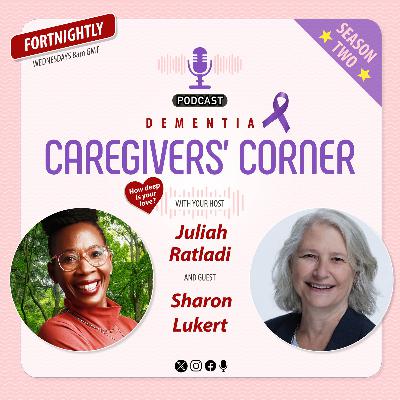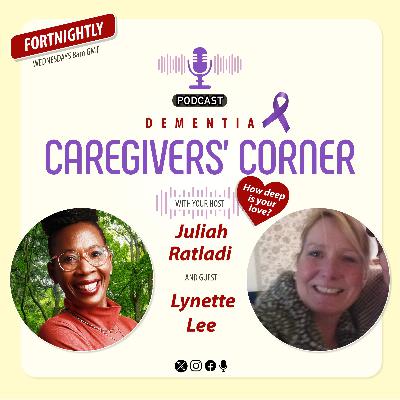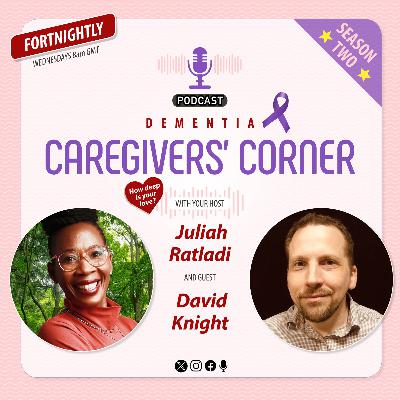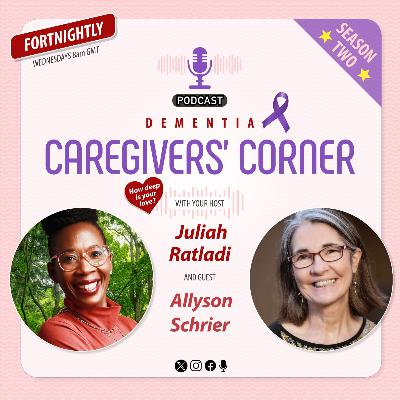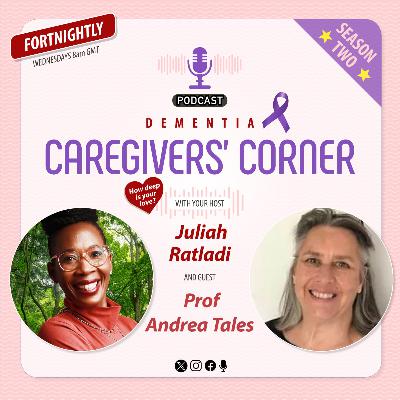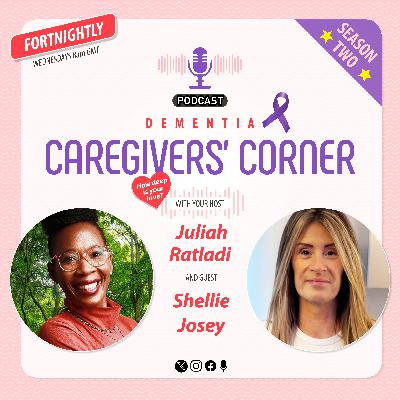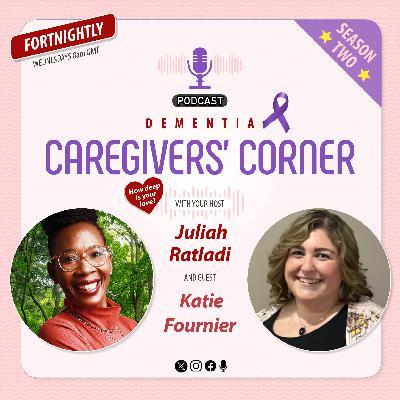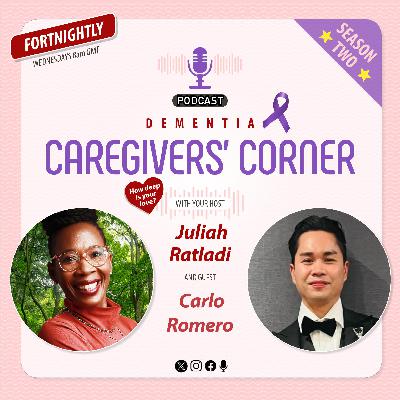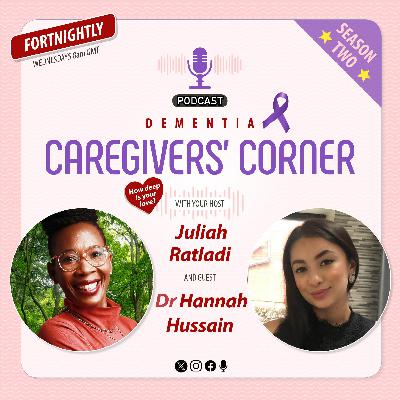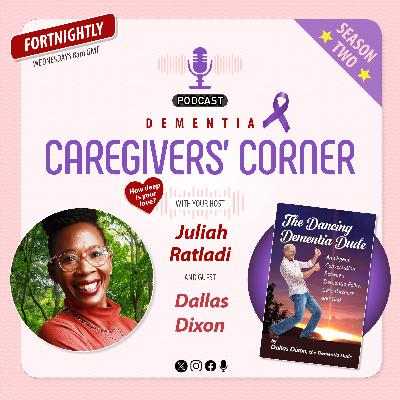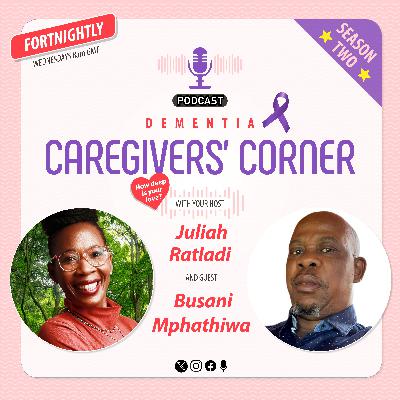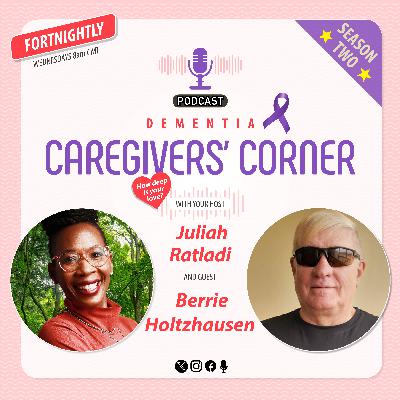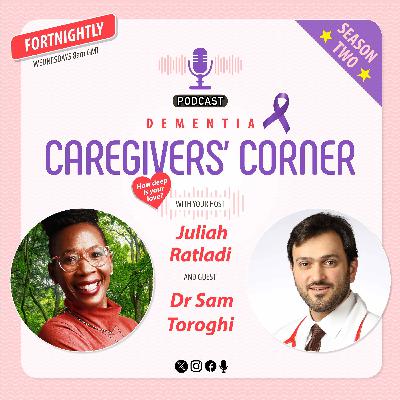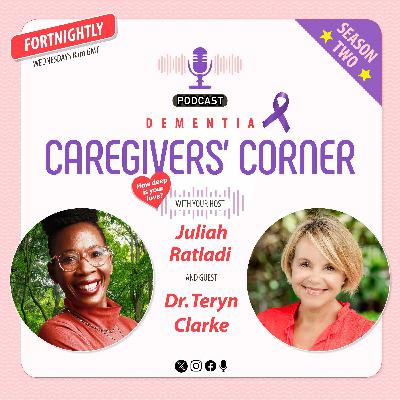Discover Dementia Caregiver’s Corner
Dementia Caregiver’s Corner

Dementia Caregiver’s Corner
Author: Juliah Ratladi
Subscribed: 10Played: 63Subscribe
Share
© Copyright 2022 All rights reserved.
Description
The journey of caring for a loved one with dementia can be deeply challenging. Juliah Ratladi, an MSc Dementia Care Specialist and experienced dementia care professional, is uniquely positioned to share her observations, experiences, knowledge, and insights on various aspects of dementia care.
Together with other dementia experts and caregivers, she raises awareness, offers encouragement, and provides hope. Through meaningful discussions, they shed light on key dementia-related issues, helping to educate and support those affected by the condition.
Dementia care: How deep is your love?
Together with other dementia experts and caregivers, she raises awareness, offers encouragement, and provides hope. Through meaningful discussions, they shed light on key dementia-related issues, helping to educate and support those affected by the condition.
Dementia care: How deep is your love?
46 Episodes
Reverse
Episode Summary:
Most families don’t fully understand dementia until it affects their own loved ones. For award-winning documentary filmmaker Kimberley Littlemore, that moment came when both her parents were diagnosed with Alzheimer’s disease. Realising how little she knew about dementia—and how few films captured the lived experience—she turned the cameras on her parents’ journey, creating a powerful series that blends personal stories with expert insights.
In this conversation, Kimberley opens about her parents’ diagnosis, what she learned as both a daughter and a filmmaker, and why films based on lived experience are so vital in raising awareness and reducing stigma around dementia. She also reflects on her work with the BBC, her contribution to a new book on dementia and sensory changes and offers advice on which mediums—film or documentary—might create the biggest impact in regions like Africa where dementia is still widely misunderstood.
Main Points Discussed
Kimberley’s journey from filmmaker to daughter documenting her own parents’ Alzheimer’s diagnosis and lived experience.
The importance of sensory and perceptual changes in dementia, and her contribution to A New Approach to Dementia.
A candid discussion on the impact of films vs. documentaries in creating dementia awareness in Sub-Saharan Africa.
Key Takeaways
Lived experience matters — Films showing real family journeys can raise awareness and break stigma in ways textbooks and statistics cannot.
Dementia isn’t just memory loss — Sensory changes and behavioural symptoms are often overlooked but deeply affect daily life.
Storytelling is powerful — Whether through documentaries or feature films, visual storytelling helps families, caregivers, and communities better understand dementia.
Resources Mentioned
Visit https://pocketmedic.org/dementia to watch Kimberley’s parents’ raw, real-life dementia journey unfold on film.
Still Alice (Drama-Film)
A New Approach to Dementia: Examining Sensory and Perceptual Impairment
Slipping Away: One Man`s Battle with Alzheimer’s` Disease
In this episode of Dementia Caregivers Corner, we’re joined by Dr. Éthelle Lord, a leading expert in dementia care, Master Dementia Coach, and creator of the Transactional Dementia Intelligence (TDI) model. We explore the critical challenges in long-term care, including staff-to-resident ratios and communication gaps between families and care providers, and discuss how these impact both residents and caregivers. Dr. Lord also explains her Lord’s Theory on the psychology of the dementia brain, and how new care models like TDI are shaping better outcomes in dementia care.
Key Points Discussed
Staffing Challenges: How low staff-to-resident ratios affect residents’ emotional and physical care.
Communication Gaps: The importance of effective communication between families and care teams.
Innovative Care Models: Introduction to the Transactional Dementia Intelligence (TDI) model and how it differs from traditional approaches.
Key Takeaways
Consistent staffing improves relationships, understanding, and wellbeing for both residents and caregivers.
Engaging families and caregivers in care planning enhances quality of care and reduces stress.
Learning and applying new models, like TDI, helps approach dementia care holistically and personally.
Let me take this time and Thank you, our dear listeners, for tuning in to this episode! If you enjoyed our conversation with Dr Lord or are passionate about dementia care, please consider leaving a review and sharing this episode with someone who might benefit from it. Your support helps us reach more people and raise awareness about dementia-related issues
Repost: In this inspirational episode Juliah sat down with Andrias Mungundu, an newly registered nurse and an advocate for dementia rights and education in Namibia.
Since his mother’s experiences with dementia Andrias has worked with organisations and government to overcome the stigma of dementia in African communities where people are often accused of witchcraft.
His mother’s experiences with lack of understanding and treatment had massive impacts on the family, but Andrias was determined to support his family
He espouses very human and sympathetic ways to care for people with dementia, arguing that they need the same sort of patience we have for small children as they need to be cared for how they cared for their families in life.
So listen in and be inspired by Andrias and his journey.
Find Andrias here:
LinkedIn:
https://www.linkedin.com/in/mangundu-andrias-54b91a246/
Follow Juliah Ratladi/Dementia Caregivers Corner Podcast on social media:
Instagram: https://instagram.com/dementiacaregiverscorner?utm_source=qr&igshid=MzNlNGNkZWQ4Mg%3D%3D
LinkedIn:
https://www.linkedin.com/in/juliah-ratladi-dementia-care-awareness/
Twitter:
https://twitter.com/DementiaCorner
Podcast Facebook Page:
https://www.facebook.com/profile.php?id=100087493920768
Do you want to be a guest? email us on: dementiacaregiverscorner@gmail.com
Dementia caregivers` Corner Podcast is available on the following platforms
Apple Podcast: https://podcasts.apple.com/us/podcast/dementiacaregiverscorners-podcast/id1710778347
Spotify: https://open.spotify.com/show/6JeVOQteK08zsc7PTkRNTT
Podbean: https://feed.podbean.com/dementiacaregiverscorner/feed.xml
Amazon Music/Audible: https://music.amazon.com/podcasts/c6e17ee2-f194-4eae-b906-a854078dd530
TuneIn/Alexa: https://feed.podbean.com/dementiacaregiverscorner/feed.xml
iHeart Radio: https://iheart.com/podcast/125013574
Player FM: https://player.fm/series/3517995
Podchaser: https://www.podchaser.com/podcasts/dementiacaregiverscorners-podc-5494017
Episode Summary:
In this episode of Dementia Caregiver’s Corner, Donna, daughter of dementia activist Agnes Houston, shares her experience supporting her mother through early-onset Alzheimer’s. She reflects on the early signs, challenges, and the emotional journey of caregiving, offering insights into maintaining family bonds and navigating gaps in support systems.
3 Key Points:
Recognizing early signs matters: Identifying behavioral changes early can lead to timely diagnosis and better planning for care.
Caregiving shapes relationships: Dementia care can both challenge and strengthen family bonds when approached with compassion and communication.
Support systems are crucial: Families often face gaps in formal support, making community, healthcare, and social support vital.
3 Takeaways for Listeners:
Observe and document early behavioral changes to help with timely dementia diagnosis.
Maintaining patience, empathy, and communication strengthens caregiver-patient relationships.
Seek support from family, community, and professionals to prevent caregiver burnout and improve the quality of care.
This episode provides insight, practical advice, and hope for families, caregivers, and anyone navigating dementia care.
#dementiacare, #Alzheimerscare, #early-onsetdementia, #caregiverssupport #caregivertips, #BPSD, #familycaregiving #SensoryImpairment
If you found this episode helpful, please leave a review and share it with someone who might benefit. Your support helps raise awareness about dementia and improves support for caregivers worldwide.
Episode Summary
In this episode of Dementia Caregivers’ Corner Podcast, we explore the often-overlooked sensory and perceptual challenges faced by people living with dementia. Our guest, Agnes Houston MBE, diagnosed with early-onset Alzheimer’s in 2006, shares her lived experience and international research through her Churchill Fellowship and her books Talking Sense and A New Approach to Dementia. Agnes opens up about how sensory changes affect daily life, why the voices of people with lived experience matter, and how her work continues to shape dementia care and awareness worldwide.
3 Key Topics Discussed
The sensory and perceptual challenges people with dementia face, from sight and sound to touch and taste.
Agnes Houston’s lived experience, research journey, and recognitions such as the MBE and Churchill Fellowship.
The importance of including voices of people with lived experience in dementia research and care practices.
3 Takeaway Points
Sensory changes are a significant but often overlooked aspect of dementia that can greatly affect daily life.
Practical strategies—like awareness, family support, and informed care—can help manage these challenges.
Empowering people with dementia to share their experiences is vital for shaping better services, understanding, and policies.
Resources Mentioned
A New Approach to Dementia: Examining Sensory and Perceptual Impairment.
Agnes Houston`s eBook: Talking Sense: Living With Sensory Changes and Dementia
https://podcasts.apple.com/nz/podcast/honouring-jennifer-josey-1944-2024-a-journey/id1710778347?i=1000686624853
Episode Summary
I am naturally loud, anyone who listens to my podcast or knows me personally can attest to that. But in this episode, my loudness mellowed. My guest brought peace, warmth, and love that were indescribable. She may not know it, but just by chatting with her, she brought me to a place of calm and stillness.
In this episode, I sit down with Sharon Lukert, a retired Buddhist chaplain and author of Until My Memory Fails Me. Sharon shares her deeply personal journey of living with Mild Cognitive Impairment (MCI) while drawing from over 20 years of experience supporting others through illness, grief, and end-of-life care. Together, we explore what it feels like to notice the first signs of memory loss, the emotional weight of seeking a diagnosis, and the everyday practices that make life meaningful.
This heartfelt conversation also looks at the role of spirituality, mindfulness, and community in coping with cognitive decline, not only for those directly affected but also for their families and caregivers. Sharon’s story is one of honesty, resilience, and compassion, offering hope and wisdom for anyone navigating similar challenges.
Key Takeaways
Early signs of MCI can be subtle but emotionally impactful, prompting reflection and the need for understanding.
Practical routines and coping strategies help maintain independence and ease daily life with cognitive changes.
Spirituality and faith can provide grounding, hope, and strength in navigating memory loss.
Connection and community are vital for both individuals and families, offering support, resilience, and shared meaning.
Key Topics Discussed
Sharon’s personal experience of living with Mild Cognitive Impairment.
The emotional journey of seeking and receiving a diagnosis.
The role of spirituality and interfaith chaplaincy in dementia care.
Inspiration and message behind Sharon’s book Until My Memory Fails Me.
Resources Mentioned
Sharon Lukert`s book " Until My Memory Fails Me" #USA
https://podcasts.apple.com/nz/podcast/living-with-dementia-dallas-dixon-reveals-what-real/id1710778347?i=1000702828681 #USA
https://podcasts.apple.com/nz/podcast/repost-c-o-r-e-c-a-r-e-principles-in-dementia-care/id1710778347?i=1000704567569 #Australia
https://podcasts.apple.com/nz/podcast/honouring-jennifer-josey-1944-2024-a-journey/id1710778347?i=1000686624853 #UK
Connect with Sharon from the following platforms;
Website: https://www.sharonlukert.com/
LinkedIn: https://www.linkedin.com/in/sharon-lukert-36266912/
If you are passionate about MCI or dementia-related issues, please share this episode with someone who might benefit from it. Until then, I’ll see you in the next episode.
Repost: In this poignant episode of "Dementia Caregiver's Corner," host Juliah Ratladi is joined by Lynnette Lee, author of "Slipping Away: One man's battle with Alzheimer's," for a heartfelt conversation about the journey of caregiving and resilience in the face of Alzheimer's disease.
Join Juliah and Lynnette as they delve into Lynnette's personal story, beginning with her father's diagnosis and the challenges she encountered in accessing support and resources. Through candid anecdotes and heartfelt reflections, Lynnette shares the highs and lows of her caregiving journey, offering listeners a glimpse into the complexities of caring for a loved one with dementia.
Despite the challenges, Lynnette also highlights the brighter moments she experienced while spending time with her father, emphasizing the power of love, connection, and cherished memories amidst the difficult realities of Alzheimer's.
Tune in to "Dementia Caregiver's Corner" for an intimate and inspiring conversation that illuminates the journey of caregiving, celebrating the resilience and strength of caregivers like Lynnette Lee. Learn from her experiences, find solace in shared stories, and discover the transformative power of love in the face of adversity.
Find Lynnette here:
X
https://x.com/LynnetteLee_Alz?t=nUKEta5ccmwWnmGlIqPz_g&s=09
Find her book here:
https://www.amazon.com/Slipping-Away-mans-battle-Alzheimers-ebook/dp/B097H7Y15W
Follow Juliah Ratladi/Dementia Caregivers Corner Podcast on social media:
Instagram: https://instagram.com/dementiacaregiverscorner?utm_source=qr&igshid=MzNlNGNkZWQ4Mg%3D%3D
LinkedIn:
https://www.linkedin.com/in/juliah-ratladi-dementia-care-awareness/
Twitter:
https://twitter.com/DementiaCorner
Podcast Facebook Page:
https://www.facebook.com/profile.php?id=100087493920768
Do you want to be a guest? email us on: dementiacaregiverscorner@gmail.com
Dementia caregivers` Corner Podcast is available on the following platforms
Apple Podcast: https://podcasts.apple.com/us/podcast/dementiacaregiverscorners-podcast/id1710778347
Spotify: https://open.spotify.com/show/6JeVOQteK08zsc7PTkRNTT
Podbean: https://feed.podbean.com/dementiacaregiverscorner/feed.xml
Amazon Music/Audible: https://music.amazon.com/podcasts/c6e17ee2-f194-4eae-b906-a854078dd530
TuneIn/Alexa: https://feed.podbean.com/dementiacaregiverscorner/feed.xml
iHeart Radio: https://iheart.com/podcast/125013574
Player FM: https://player.fm/series/3517995
Podchaser: https://www.podchaser.com/podcasts/dementiacaregiverscorners-podc-5494017
Episode Summary
In this insightful conversation, Juliah is joined by David Knight, Advanced Clinical Practitioner and Independent Prescribing Optometrist, UK, to explore how vision and perception are affected by dementia. Using real-life examples and clinical experience, David breaks down how the brain and eyes work together—and how dementia disrupts this connection. From the differences across dementia types to practical home adjustments, this episode helps caregivers and professionals better understand visual challenges in dementia and how to address them.
4 Key Topics Discussed:
How dementia affects visual processing – explained through the case of Jennifer and the wristwatch vs. clock scenario.
Differences in visual symptoms across dementia types – including Alzheimer’s, Lewy Body, and frontotemporal dementia.
The connection between eyesight and cognitive decline – does poor vision contribute to dementia, or vice versa?
Vision assessments and accessibility – including tips for clinicians and caregivers on evaluating visual function in individuals with cognitive impairment.
4 Key Takeaways:
Vision and the brain are tightly linked—dementia can distort visual interpretation even when the eyes are healthy.
Types of dementia affect vision differently—for example, Lewy Body dementia often causes visual hallucinations, while vascular dementia may affect contrast or depth perception.
Misinterpreting visual signs can be risky—caregivers might mistake visual dysfunction for stubbornness, which can lead to frustration or accidents.
Small home adaptations can make a big difference—like lighting, contrast, and simplifying visual clutter to support safety and independence.
#dementia #vision loss #Lewybodydementia #sensoryperception #dementiacare #optometristinterview #cognitivedecline
Resources Mentioned
A New Approach to Dementia: Examining Sensory and perceptual Impairment
https://podcasts.apple.com/nz/podcast/designing-for-dementia-how-smart-technology-and/id1710778347?i=1000715402699
https://podcasts.apple.com/nz/podcast/honouring-jennifer-josey-1944-2024-a-journey/id1710778347?i=1000686624853
Share this episode with a friend, colleague, or family caregiver who may benefit from learning more about sensory changes, visual dysfunction, smart technology, and environmental design in dementia care.
If you found this episode helpful, please follow, rate, and review the Dementia Caregivers’ Corner Podcast on your favourite listening platform.
Episode Summary:
In this episode of the Dementia Caregivers’ Corner Podcast, we’re joined by Allyson Schrier, a passionate dementia care advocate, educator, and co-founder of Zinnia TV, a tech platform designed to support individuals living with dementia and reduce stress for caregivers.
Allyson shares her personal journey as a caregiver for her husband and how that experience inspired her to launch a dementia-friendly technology company at the age of 60.
We explore:
How Zinnia TV uses video content to enhance engagement and well-being
Strategies for making technology accessible and user-friendly for older adults
Insights into compassionate caregiving practices
The challenges and rewards of launching an AgeTech company
Inclusivity and cultural relevance in dementia care for immigrant families
The future of AgeTech and the role of innovation in dementia support
Whether you’re a caregiver, healthcare provider, or simply curious about how technology can support dementia care, this episode offers valuable insights into the evolving landscape of compassionate, tech-enabled caregiving.
4 Key Topics Discussed
The origin and purpose of Zinnia TV
A platform created to engage individuals with dementia through tailored video content.
Integrating technology in elder care
How to make digital tools accessible for older adults and their caregivers.
Compassionate caregiving practices
Practical approaches to offering care with empathy and understanding.
The future of AgeTech and dementia care
Trends, innovations, and what lies ahead for tech solutions in dementia support.
4 Key Takeaways
Personal experience can drive impactful innovation
Allyson’s journey as a caregiver for her husband inspired the creation of Zinnia TV, showing how lived experience can lead to meaningful solutions in dementia care.
Technology can be both simple and supportive
Zinnia TV demonstrates that digital tools for people with dementia can be accessible, user-friendly, and effective in reducing stress and improving quality of life.
Compassion is at the heart of dementia care
Compassionate caregiving strategies not only support those living with dementia but also protect the emotional well-being of caregivers.
Cultural inclusivity is essential in AgeTech
For tech solutions like Zinnia TV to be effective across diverse communities, they must reflect the cultural, linguistic, and social realities of users—including immigrant and African families.
Resources Mentioned
A New Approach to Dementia: Examining Sensory and Perceptual Impairment
Professor Andrea`s Episode Link Below
https://podcasts.apple.com/nz/podcast/designing-for-dementia-how-smart-technology-and/id1710778347?i=1000715402699
Share this episode with a friend, colleague, or family caregiver who may benefit from learning more about vision dysfunction and cognitive decline
If you found this episode helpful, please follow, rate, and review the Dementia Caregivers’ Corner Podcast on your favourite listening platform.
Episode Summary:
In this episode, Professor Andrea Tales, joins us to explore how dementia affects more than just memory, focusing on the often-overlooked sensory and perceptual changes. We discuss how smart technology, and thoughtful environmental design can better support people living with dementia, reduce distress, and improve quality of life. Whether you're a caregiver or professional, this conversation offers practical insights and new ways to think about dementia care.
Key Topics:
Sensory and Perceptual Changes in Dementia
– Understanding how visual dysfunction and other sensory issues impact behaviour and daily life.
Environmental Design
– How adapting home and public spaces can improve safety, familiarity, and independence for people living with dementia.
SMART Technology in Dementia Care
– The role of devices like Alexa and clocks in reducing anxiety and supporting routine, communication, and calmness.
Shifting from Trial-and-Error to Personalised Support
– Helping caregivers make informed choices about technology and care strategies based on the individual’s needs.
Key Takeaways:
Dementia isn’t just about memory loss, sensory changes like vision, balance, and perception are equally important but often overlooked.
These changes can lead to distress, confusion, and safety risks if not properly addressed.
Simple environmental changes, like adjusting colours, lighting, or layout—can make a big difference in helping people with dementia feel safe and oriented.
SMART technologies can enhance care when introduced at the right time and tailored to the person’s stage and needs, but they should support, not replace, human connection.
Caregivers benefit most when they move away from random solutions and instead use evidence-based, personalised strategies that truly fit their loved one’s situation.
Resources Mentioned
-A New Approach to Dementia: Examining Sensory and Perceptual Impairment
-Wendy Mitchell`s books
Share this episode with a friend, colleague, or family caregiver who may benefit from learning more about sensory changes, smart technology, and environmental design in dementia care.
If you found this episode helpful, please follow, rate, and review the Dementia Caregivers’ Corner Podcast on your favourite listening platform.
In this heartfelt episode, we pay tribute to Jennifer Mavis Josey, affectionately known as Jen, who passed away in October 2024 from mixed dementia. Shellie Josey, Jen’s only daughter, joins us to reflect on her mum’s life, their family’s caregiving journey, and how they’ve been coping since her passing.
We explore Jen’s background, her role as a mother and sister, and the qualities that made her so special. Shellie shares insights into the early symptoms of dementia, the family’s initial struggles, and how they learned to navigate life with her diagnosis. She discusses the importance of family unity, the challenges of accessing social care, and the value of maintaining friendships for those living with dementia.
The episode also highlights the family’s commitment to honoring Jen’s wish to remain at home, the adjustments they made to accommodate her needs, and Shellie’s journey toward finding purpose after her mother’s death.
Shellie concludes with advice for families caring for parents with dementia, offering encouragement and wisdom to those on a similar path.
This episode is a celebration of Jen’s legacy and a source of inspiration and support for caregivers and families worldwide.
Key Takeaways from This Episode:
Family Unity is Vital
Caring for a loved one with dementia requires strong family collaboration and support. Shellie emphasized how working together as a family helped them navigate the emotional and practical challenges of Jen’s dementia journey.
Early Symptoms Often Go Unrecognized
Many families, including Jen’s, are unaware of dementia until it directly impacts them. Recognizing unusual behaviors and seeking timely medical advice is crucial for early diagnosis and better care planning.
The Importance of Honoring Wishes
Jen’s wish to remain at home rather than move to a care home required significant adjustments and sacrifices. Shellie’s story highlights the importance of respecting a loved one’s preferences and finding ways to fulfill them despite challenges.
Friendships Play a Key Role
Maintaining relationships is essential for individuals living with dementia. Shellie shared how Jen’s friends continued visiting her, providing comfort and connection. Encouraging friendships, even in advanced stages, can greatly enhance a person’s quality of life.
Some resources mentioned
Alzheimers.org.uk
https://podcasts.apple.com/nz/podcast/navigating-the-journey-a-daughters-tale-of/id1710778347?i=1000650588431
Enjoyed this episode? Remember to subscribe, leave a review and share it with someone who might benefit!
In this episode of Dementia Caregivers` Corner Podcast, I’m joined by Katie Fournier, LPN, CDP from Ember Holistic Care in the USA as we continue our discussion on non-medical approaches to managing dementia-related behaviors. Building on our previous conversation with co-founder Shari Flight, we explore effective holistic strategies that prioritize compassionate care before turning to medication.
What we cover in this episode:
Effective holistic approaches for managing dementia-related behaviours.
How to personalize non-medication strategies for each individual.
Common misconceptions about holistic dementia care and how to address skepticism.
The benefits of mindfulness and meditation for individuals living with dementia and their caregivers.
Plus, we end with a special guided meditation designed to bring calm and connection.
Key Takeaways
Holistic Approaches Can Reduce the Need for Medication – Non-medical interventions, such as sensory stimulation, music therapy, and environmental adjustments, can effectively manage dementia-related behaviors before turning to medication.
Personalized Care is Essential – Dementia affects each person differently, so tailoring interventions to individual needs, preferences, and history leads to better outcomes and improved well-being.
Mindfulness & Meditation Benefit Both Caregivers and Individuals with Dementia – Practices like guided meditation and breathing exercises can reduce stress, enhance emotional connection, and create moments of calm for both caregivers and those they support.
Resources Mentioned
https://podcasts.apple.com/nz/podcast/alternative-approaches-to-combat-dementia-related-behaviours/id1710778347?i=1000653429777
#DementiaCare #CaregivingTips #MindfulCare #GuidedMeditation #DementiaAwareness #HolisticHealth #FamilyCaregiver #ElderCare #DCCP #MentalHealthForCaregivers #MentalHealth
If you enjoyed our conversation or are passionate about dementia care, please consider leaving a review and sharing this episode with someone who might benefit from it. Your support helps us reach more people and raise awareness about dementia-related issues.
Episode Summary: In this episode, I am joined by Carlo Romero, a medical professional from a rehabilitation facility in the UK. Together, we explore what rehabilitation means in the context of dementia—how it helps individuals maintain their independence and well-being.
We discuss the challenges people living with dementia and their caregivers face when accessing rehabilitation and, most importantly, how these challenges can be addressed to improve their quality of life.
Key topics include:
1. What sparked Carlo’s interest in dementia rehabilitation
2. The role and benefits of rehabilitation in dementia care
3. Challenges in providing rehabilitation, especially for those with severe communication difficulties
4. The importance of multidisciplinary collaboration in dementia rehabilitation
Real-world examples of successful rehabilitation strategies
5. Key improvements needed in healthcare and social care services
Key Takeaways:
1. Rehabilitation supports independence – Even in dementia, rehabilitation can help maintain functional abilities and improve well-being.
2. Communication challenges impact rehabilitation – People with dementia who struggle with speech often miss out on vital rehabilitation, highlighting the need for alternative approaches.
3. Multidisciplinary teamwork is crucial – Collaboration between healthcare and social care professionals can enhance rehabilitation outcomes.
4. Dementia rehabilitation needs improvement – Better training, resources, and awareness can help make rehabilitation more accessible and effective.
Resources Mentioned
World Health Organization
Dementia UK
Dementia Friends
What I Wish People Knew about Dementia - Wendy Mitchell
Somebody I Used to Know - Wendy Mitchell
Tune in to gain insights into dementia rehabilitation and how we can better support individuals living with dementia.
Episode Summary:
In this thought-provoking episode of the Dementia Caregivers Corner Podcast, host Juliah is joined by Dr Hannah Hussain, a Health Economist at the Office of Health Economics in London. Dr Hussain, who holds a PhD in health economics from the University of Sheffield and is a qualified pharmacist, shares her insights into the challenges that Black, Asian, and Minority Ethnic (BAME) communities face in accessing dementia care.
From cultural stigma and late diagnoses to language barriers and the overlooked role of unpaid carers, this episode dives deep into the structural and social factors that limit access to timely and culturally sensitive dementia support. Dr Hussain also highlights the importance of inclusive research and culturally competent care homes in addressing these disparities.
Key Topics Discussed:
Barriers to dementia diagnosis and care in BAME communities
Economic impact of unpaid caregiving on families and the healthcare system
The need for culturally competent dementia services and inclusive research
Key Takeaways:
Cultural stigma and expectations in BAME communities can discourage families from seeking formal dementia care, contributing to late diagnoses and hidden burdens.
Unpaid carers in BAME households save the NHS substantial costs but often lack adequate support and recognition.
Culturally competent care and language access are essential for improving dementia services for diverse communities.
Resources Mentioned
https://www.dementiaresearcher.nihr.ac.uk/blog-challenges-of-dementia-care-for-ethnic-minorities-in-the-uk/
https://www.dementiaresearcher.nihr.ac.uk/blog-coping-with-distress-the-strength-of-caregivers/
https://www.dementiaresearcher.nihr.ac.uk/blog-the-economics-of-dementia/
Repost: This week sees the return of popular guest Isabel Baker, a retired clinical nurse consultant and author from Australia who has more fascinating insights to share about her work, and what she learned in her time as a dementia caregiver and how she helps others learn what is truly needed by those with dementia.
The conversation begins with the fascinating insight that many dementia symptoms can be caused by other issues and moves on to a discussion of Isabel’s C.O.R.E.C.A.R.E principles of caring for those with dementia.
Each letter is an important insight on its own, but it truly all about treating each person as an individual.
So, listen in, and learn about how to take care of the individual.
Find Isabel on LinkedIn here:
https://www.linkedin.com/in/isabel-baker-4770466b
Find more information about Isabel and her work here:
https://isabelbaker.net/
Follow Juliah Ratladi/Dementia Caregivers Corner Podcast on social media:
Instagram: https://instagram.com/dementiacaregiverscorner?utm_source=qr&igshid=MzNlNGNkZWQ4Mg%3D%3D
LinkedIn:
https://www.linkedin.com/in/juliah-ratladi-dementia-care-awareness/
Twitter:
https://twitter.com/DementiaCorner
Podcast Facebook Page:
https://www.facebook.com/profile.php?id=100087493920768
Do you want to be a guest? email us on: dementiacaregiverscorner@gmail.com
Dementia caregivers` Corner Podcast is available on the following platforms
Apple Podcast: https://podcasts.apple.com/us/podcast/dementiacaregiverscorners-podcast/id1710778347
Spotify: https://open.spotify.com/show/6JeVOQteK08zsc7PTkRNTT
Podbean: https://feed.podbean.com/dementiacaregiverscorner/feed.xml
Amazon Music/Audible: https://music.amazon.com/podcasts/c6e17ee2-f194-4eae-b906-a854078dd530
TuneIn/Alexa: https://feed.podbean.com/dementiacaregiverscorner/feed.xml
iHeart Radio: https://iheart.com/podcast/125013574
Player FM: https://player.fm/series/3517995
Podchaser: https://www.podchaser.com/podcasts/dementiacaregiverscorners-podc-5494017
Episode Summary:
In this episode of Dementia Caregivers` Corner Podcast, Juliah speaks with Mr. Dallas Dixon, who is living with dementia. Together, they explore how different stakeholders, such as policymakers, healthcare professionals, and caregivers can better support people with dementia.
Mr. Dixon shares his perspective on the misconceptions and misunderstandings surrounding dementia and discusses the aspects of identity that he believes remain untouched by the condition, which he attributes to his faith. He also talks about his journey as an author, including the inspiration behind his books, particularly The Dancing Dementia Dude, and the messages he hopes to share with the world.
Key Takeaways from This Episode
The importance of well-structured dementia policies that truly address the needs of those living with the condition.
The need for better education and awareness among healthcare professionals and caregivers to improve dementia care.
The power of faith, personal identity, and storytelling in reshaping the narrative around dementia.
Resources Mentioned
John: Chapter 14 verse 26
World Health Organization
Teepa Snow
https://podcasts.apple.com/nz/podcast/shes-brave-life-after-early-onset-alzheimers-claimed/id1710778347?i=1000679985387
If you found this episode helpful, please leave a review, and share with someone who might benefit from it. This helps us to reach more people and create more awareness about dementia related issues.
Episode Summary:
In this episode of Dementia Caregivers` Corner, Juliah sits down with Rre Busani Mphathiwa, an advocate for dementia awareness and the founder of Pelonomi Foundation (Dementia Botswana). They explore the cultural, linguistic, and systemic challenges affecting dementia understanding and care in Botswana and Sub-Saharan Africa.
A major issue? There is no Setswana word for “dementia.” This language gap, combined with deep-rooted cultural misconceptions, fuels stigma and prevents many families from seeking help.
What You’ll Learn in This Episode:
The Language Barrier – Many African languages, including Setswana, lack a direct translation for "dementia," making awareness efforts more difficult.
Cultural Misconceptions – Dementia symptoms are often attributed to witchcraft, curses, or divine punishment, leading to isolation and neglect.
Recognizing Dementia Symptoms – Memory loss, confusion, and behavioral changes are early warning signs often misunderstood in African communities.
The Power of Advocacy – How organizations like Dementia Botswana are driving change through education, policy influence, and community outreach.
Resources Mentioned:
Academic Article: Beliefs and Attitudes Towards Dementia Among Community Leaders in Northern Nigeria
Website: pelonomi.com
Why This Matters:
Dementia cases are rising in Sub-Saharan Africa, yet awareness and support systems remain limited. This episode sheds light on why breaking the stigma is crucial for better care and policy development.
Listen Now & Get Involved!
Enjoyed this episode? Leave a rating & review to help us reach more caregivers and families.
Spread Awareness! Share this episode with someone who needs to hear it.
Follow and connect with Dementia Caregivers’ Corner Podcast on the following social media channels
https://www.youtube.com/@DementiaCaregiversCorner
https://instagram.com/dementiacaregiverscorner?utm_source=qr&igshid=MzNlNGNkZWQ4Mg%3D%3D
https://www.linkedin.com/in/juliah-ratladi-dementia-care-awareness/
https://twitter.com/DementiaCorner
https://www.facebook.com/profile.php?id=100087493920768]
https://www.tiktok.com/@dementiacaregiverscorner?_t=ZG-8t2YpBR5llR&_r=1
Connect with Pelonomi Foundation on the following social media platforms
Facebook: Pelonomi Foundation
Twitter: @Pelonomihealth
www.pelonomi.com
In today’s episode, we are thrilled to welcome back Berrie Holtzhausen from Namibia, Africa. Berrie is the Founder and CEO of Alzheimer Dementia Namibia (ADN) and the visionary behind the Dementia Care Farm, a place of safety for people living with dementia, especially those wrongly accused of witchcraft.
Berrie was diagnosed with Alzheimer’s disease in 2020 and has since become a dedicated advocate for people living with dementia (PLWD). In this episode, he shares his personal experiences, the challenges of stigma, and his innovative approach to prolonging life with dementia.
Key Topics Discussed:
Berrie’s personal updates on living with dementia and how he manages changes in memory and focus.
His concept of DNA for prolonging life with dementia – a philosophy emphasizing inclusion and quality of life.
The importance of cultural awareness in dementia care—understanding backgrounds, emotions, and communication styles.
His ongoing work on a dementia-friendly village—an initiative to educate families and traditional leaders on dementia to combat stigma and harmful beliefs.
Key Takeaways:
Do not disconnect me from life." A dementia diagnosis does not mean immediate incapacity—staying engaged is crucial.
Stigma isolates people. Many friends walk away due to misconceptions about dementia, making social support even more essential.
Senses play a vital role. While memory fades, sensory experiences (smell, touch, hearing) can help PLWD navigate their world.
Education can change communities. By involving traditional leaders, Berrie’s dementia-friendly village aims to shift harmful narratives and improve dementia care.
Resourced Mentioned
Berrie`s 1st Episode
https://podcasts.apple.com/nz/podcast/breaking-stigma-building-community-berrie-holtzhausens/id1710778347?i=1000649023519
Connect with Berrie here:
Linkedin:
https://www.linkedin.com/in/berrie-holtzhausen-b5a61736
Instagram:
https://www.instagram.com/africanwitchfinder/
Follow Juliah Ratladi/Dementia Caregivers` Corner Podcast on social media:
Instagram:
https://instagram.com/dementiacaregiverscorner?utm_source=qr&igshid=MzNlNGNkZWQ4Mg%3D%3D
LinkedIn:
https://www.linkedin.com/in/juliah-ratladi-dementia-care-awareness/
Twitter:
https://twitter.com/DementiaCorner
Facebook Page:
https://www.facebook.com/profile.php?id=100087493920768
TikTok
https://www.tiktok.com/@dementiacaregiverscorner?_t=ZN-8ubbs0NIeZS&_r=1
YouTube
http://www.youtube.com/@DementiaCaregiversCorner
In this episode, we delve into key aspects of dementia care, starting with how to distinguish dementia from normal aging. We explore the stages of dementia, their progression, and what they look like in everyday life. You'll learn actionable steps to take after a loved one is diagnosed, along with effective strategies for communicating with individuals who have lost verbal abilities.
We also discuss ways to manage the behavioral and psychological symptoms of dementia and provide guidance on coping with caregiver guilt. This episode is packed with practical insights and compassionate advice to support caregivers and families navigating the dementia journey.
Key Take Aways:
Understanding Dementia vs. Normal Aging: Differentiating between dementia and the typical cognitive changes associated with aging.
Stages of Dementia: A breakdown of the different stages of dementia and how they present over time.
Steps After Diagnosis: Guidance on what to do after a loved one receives a dementia diagnosis.
Non-Verbal Communication Strategies: Effective ways to connect with someone who has lost the ability to communicate verbally.
Managing Behavioral and Psychological Symptoms: Practical tips for addressing common behavioral and psychological challenges associated with dementia.
Addressing Caregiver Guilt: Strategies to recognize, cope with, and overcome feelings of guilt as a caregiver.
Some Resources mentioned:
The Practical Dementia Caregiver Guide: Sam Toroghi MD https://mybook.to/DementiaSamToroghi
https://www.facebook.com/groups/dementiaheroes
One Last Thing: How to Live With the End in Mind: Wendy Mitchell
Alzheimer’s Association UK, USA
net/dementia
Enjoyed this episode? Remember to subscribe, leave a review and share it with someone who might benefit!
Dementia Caregivers` Corner Podcast streams from the following platforms, and more…
https://podcasts.apple.com/us/podcast/dementiacaregiverscorners-podcast/id1710778347
https://www.youtube.com/@DementiaCaregiversCorner
https://open.spotify.com/show/6JeVOQteK08zsc7PTkRNTT
https://music.amazon.com/podcasts/c6e17ee2-f194-4eae-b906-a854078dd530
https://feed.podbean.com/dementiacaregiverscorner/feed.xml
https://iheart.com/podcast/125013574
https://player.fm/series/3517995
https://www.podchaser.com/podcasts/dementiacaregiverscorners-podc-5494017
https://www.facebook.com/profile.php?id=100087493920768]
Connect with Dr Sam Toroghi on the following social media platforms
https://www.facebook.com/SamToroghiMD/
https://www.facebook.com/Dementiacaregiverguide
https://www.linkedin.com/in/toroghi/
Follow and connect with Dementia Caregivers’ Corner Podcast on the following social media channels
https://www.youtube.com/@DementiaCaregiversCorner
https://instagram.com/dementiacaregiverscorner?utm_source=qr&igshid=MzNlNGNkZWQ4Mg%3D%3D
https://www.linkedin.com/in/juliah-ratladi-dementia-care-awareness/
https://twitter.com/DementiaCorner
https://www.facebook.com/profile.php?id=100087493920768]
https://www.tiktok.com/@dementiacaregiverscorner?_t=ZG-8t2YpBR5llR&_r=1
Do you want to be a guest? email us on: dementiacaregiverscorner@gmail.com
Join us for an enlightening conversation with Dr. Teryn Clarke, a leading expert in preventive medicine and healthy aging, as we explore the power of lifestyle changes to improve long-term health outcomes. In this episode, we dive into the science-backed strategies that can help you live a longer, healthier life—starting today.
Dr. Clarke shares practical advice on three key areas:
Diet: How small tweaks to your eating habits can reduce the risk of chronic diseases.
Exercise: The types and amounts of physical activity that deliver the most benefits as we age.
Alcohol: Understanding the impact of alcohol consumption and how moderation can play a role in maintaining health.
But that’s not all—Dr. Clarke also offers invaluable insights into managing dementia with empathy and compassion. Whether you’re caring for a loved one or working in healthcare, you’ll learn actionable tips to support individuals living with dementia while preserving their dignity and quality of life.
Tune in to discover how the choices you make today can shape your future—and how you can help others along the way. This episode is a must-listen for anyone looking to take control of their health and make a positive difference in the lives of those around them.
Enjoyed this episode? Remember to subscribe, leave a review and share it with someone who might benefit!
Dementia Caregivers` Corner Podcast streams from the following platforms, and more…
https://podcasts.apple.com/us/podcast/dementiacaregiverscorners-podcast/id1710778347
https://www.youtube.com/@DementiaCaregiversCorner
https://open.spotify.com/show/6JeVOQteK08zsc7PTkRNTT
https://music.amazon.com/podcasts/c6e17ee2-f194-4eae-b906-a854078dd530
https://feed.podbean.com/dementiacaregiverscorner/feed.xml
https://iheart.com/podcast/125013574
https://player.fm/series/3517995
https://www.podchaser.com/podcasts/dementiacaregiverscorners-podc-5494017
https://www.facebook.com/profile.php?id=100087493920768]
Connect with Dr Teryn Clarke
https://www.clarkeneurology.com/
https://www.instagram.com/brainhealthactionplan/
https://www.linkedin.com/in/teryn-clarke-b166a314a/
And find her book here
https://www.amazon.com/Brain-Health-Action-Plan-Science-Backed-ebook/dp/B0D79KXD7Y?ref_=ast_author_mpb
Follow and connect with Dementia Caregivers’ Corner Podcast on the following social media channels
https://www.youtube.com/@DementiaCaregiversCorner
https://instagram.com/dementiacaregiverscorner?utm_source=qr&igshid=MzNlNGNkZWQ4Mg%3D%3D
https://www.linkedin.com/in/juliah-ratladi-dementia-care-awareness/
https://twitter.com/DementiaCorner
https://www.facebook.com/profile.php?id=100087493920768]
https://www.tiktok.com/@dementiacaregiverscorner?_t=ZG-8t2YpBR5llR&_r=1
Do you want to be a guest? email us on: dementiacaregiverscorner@gmail.com







